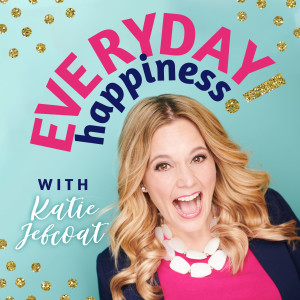
Everyday Happiness - Finding Harmony and Bliss
Education:Self-Improvement

664-My Biggest Happiness Takeaways From Writing 660+ Happiness Podcast Episodes: Defining Happiness and Control
 2023-03-27
2023-03-27
Good news! We have some control over our happiness, and we know how to boost it. Listen in today as we discuss the definition of happiness and what scientists think about how much DNA matters. This is one of my biggest takeaways from writing 668 daily happiness podcast episodes. Tune in to learn more.
Transcript:
Welcome to Everyday Happiness, I'm your host Katie Jefcoat, and as we close out this podcast, we invite you to join our happy mail email community, where you’ll continue to get happiness and kindness content delivered straight to your inbox. We think it’s the happiest email in your inbox. You can join at www.katiejefcoat.com
Today, I share one of my biggest takeaways from writing 668 daily happiness podcasts. It’s the definition of happiness and where we can get the biggest impact for our effort to boost our happiness.
So many of us think we'll be happy when we work hard and achieve success. But the fact is, that will never work. Our brains are designed to move the goalpost to the next thing. If fulfilled happiness is on the other side of achievement, we’ve already lost because we will never get there.
Now, you get the job promotion, and you feel happy - for a moment. But soon, your big job promotion is just your job. That fancy new car, the new car smell has worn off, and it’s just your car. Scientists call this the hedonic treadmill, always trying to achieve the next best thing.
Most scientists agree that happiness is really a two-pronged definition. The first prong is happiness in emotions. The second prong is satisfaction and purpose. You need both prongs to be fulfilled to achieve well-rounded happiness.
Emotions, such as joy, contentment, love, and other positive feelings like peace, gratitude, satisfaction, pleasure, inspiration, hope, curiosity, and love, fall into this first prong. In her 2007 book The How of Happiness, Sonja Lyubomirsky describes happiness as "the experience of joy, contentment, or positive well-being, combined with a sense that one's life is good, meaningful, and worthwhile." These emotions stem from the positive experiences we have in life.
The second prong has two parts. Purpose and satisfaction.
Purpose is how you feel when you are doing the thing you love. This can be academic research, your work, building a business, being involved in the community, being a parent, and more.
Arthur Brooks says that long-lasting happiness comes from human connection and productive work. He found in his scientific research that it was overwhelmingly clear that a “productive human endeavor creates a sense of purpose in life.”
Satisfaction is appreciating what you have more than pining for what you want.
Many of us think we will be more satisfied, happier even, if we get more of what we want. However, the scientific theory of hedonic adaptation tells us that we get comfortable with what we have, and we always want more. Satisfaction is elusive and doesn’t last with that mentality; it’s like running on a treadmill and never getting to the destination. So, it's basically impossible to "get more" and be happier long term. This is why the gurus tell you that gratitude is so important to achieve happiness. It is bringing you back to the here and now.
Satisfaction is not a function of what you have; it's actually an equation of what you HAVE and what you WANT. Think of it like a fraction: the top is what you have, and the bottom is what you want. So you want to appreciate what you have more than pine for what you want.
This all seems easy enough, but I was curious, how much is actually in our control?
Arthur Brooks says that happiness is 50% genetic, 25% circumstantial, and 25% in your control.
Sojyna Lyubomirsky has similar findings. Although it’s never a neat and tidy pie chart, experts agree that we humans have some control over our happiness and it’s not all left up to DNA or chance. The researchers from the 2005 Lyubomirsky paper later said that “Happiness can be successfully pursued, but it is not ‘easy,’” In other words, happiness for many people will simply be something that is hard won. For others, happiness may feel like a natural state.
The insight is simple, and it’s good news. This means that happiness is deeper than our emotions and we have some control over our happiness. The bonus is that we know how to enhance our happiness through simple tiny habits like savoring, gratitude, kindness and so much more.
Remember, kindness is contagious, go out there and spread some kindness today.
Life is heavy enough; we shouldn’t have to search for happiness. Get the exclusive happiness email, delivered with a smile twice a month to your inbox. https://www.katiejefcoat.com/email
And, let’s connect on social at @everydayhappinesswithkatie and join the community on the hashtags #IntentionalMargins and #everydayhappinesswithkatie on Instagram
Links: https://onamission.bio/everydayhappiness/
Inspiration from:
- https://arthurbrooks.com/art-of-happiness/
- 2005 paper
- https://greatergood.berkeley.edu/article/item/how_much_of_your_happiness_is_under_your_control
More Episodes
 2022-10-27
2022-10-27
 54
54
 2022-10-26
2022-10-26
 47
47
 2022-10-25
2022-10-25
 42
42
 2022-10-24
2022-10-24
 48
48
 2022-10-23
2022-10-23
 42
42
 2022-10-22
2022-10-22
 44
44
 2022-10-21
2022-10-21
 43
43
 2022-10-20
2022-10-20
 44
44
 2022-10-19
2022-10-19
 50
50
 2022-10-18
2022-10-18
 44
44
 2022-10-17
2022-10-17
 47
47
 2022-10-16
2022-10-16
 46
46
 2022-10-15
2022-10-15
 48
48
 2022-10-14
2022-10-14
 45
45
 2022-10-13
2022-10-13
 47
47
 2022-10-12
2022-10-12
 50
50
 2022-10-11
2022-10-11
 46
46
 2022-10-10
2022-10-10
 55
55
 2022-10-09
2022-10-09
 47
47
 2022-10-08
2022-10-08
 46
46
Create your
podcast in
minutes
- Full-featured podcast site
- Unlimited storage and bandwidth
- Comprehensive podcast stats
- Distribute to Apple Podcasts, Spotify, and more
- Make money with your podcast
It is Free
- Privacy Policy
- Cookie Policy
- Terms of Use
- Consent Preferences
- Copyright © 2015-2024 Podbean.com




